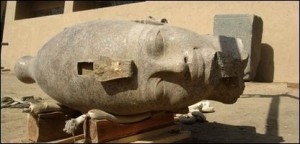The New York Times thinks so.
In a recent lead editorial entitled “President Abbas and Peace Talks,” ostensibly about the Palestinian leader, the paper couldn’t resist the temptation to take a swipe — or two or three — at Netanyahu. It could barely contain its rage, suspicion, and doubt about the Israeli prime minister. But, then again, that’s par for the course.
Go figure.
Since taking office, Netanyahu has moved his Likud Party squarely into the two-state camp. That’s no mean feat. The party fiercely resisted the idea since its inception. Indeed, previous Likud leaders Ariel Sharon and Ehud Olmert had to leave in order to stake out more centrist positions. Netanyahu has taken the party — at least important segments of it — with him in this historic turnaround both for him and his faction.
He has also removed dozens of security checkpoints on the West Bank, permitting freer movement of people and goods, and helped encourage the dramatic growth spurt in the Palestinian economy.
And he did what no predecessor ever had, agreeing to a temporary freeze on all new construction in West Bank Jewish settlements. Done at the behest of President Obama, this was intended as a goodwill gesture to help restart peace talks with the Palestinians. The domestic political price that had to be paid didn’t stop Netanyahu.
Meanwhile, he is juggling some staggering challenges.
First, when he assumed office in 2009, he faced a new U.S. administration that sent decidedly mixed signals about its attitude toward Israel. Indeed, many speculated that an early goal was to rejigger the Israeli government, perhaps removing Netanyahu in the process. Given the outsized role of America in Israel’s life, the bilateral issue alone kept Netanyahu rather busy.
Second, thanks to Israel’s outdated electoral laws, he has an awkward, time-consuming coalition that seeks to pull him in various, often contradictory, directions. While a different government make-up may be desirable, that has eluded Netanyahu to date.
Third, Iran is moving relentlessly toward the nuclear goal line, posing an unprecedented threat to Israel’s security. Any Israeli leader would be equally preoccupied with this menace and how to deal with it.
Fourth, Iran’s proxies, Hamas and Hezbollah, are gaining in military strength. Both sit on Israel’s borders, and both are preparing themselves for new rounds of conflict with Israel, which, in their minds, has no right to exist. Hamas, in fact, has already stepped up deadly acts of terror in response to the resumption of Israeli-Palestinian peace talks.
And fifth, Syria is flexing its muscles once again, seeking advanced Russian weaponry and casting a long shadow on neighboring Lebanon’s affairs.
Moreover, Netanyahu presides over a country that has grown more skeptical of peace prospects over the past decade. That does not suggest any decline in the yearning for peace, only greater doubt that it can be achieved.
Three events in particular explain this attitudinal change.
There was the dramatic offer by Prime Minister Ehud Barak, in 2000, with the full support of President Bill Clinton, for a two-state settlement. The result? A Palestinian “intifada” that killed more than one thousand Israelis. In proportional terms, that would be the equivalent of 40,000 American fatalities.
There was the Israeli withdrawal from the security zone in southern Lebanon, also in 2000. The result? Hezbollah filled the vacuum, brought weaponry closer to the border, and triggered the 2006 war.
And then there was the Israeli withdrawal from Gaza in 2005, giving local residents the first chance in their history to govern themselves. The result? Hamas took over, kicked out the Palestinian Authority in a bloody civil war, smuggled in heavy weapons, and fired thousands of missiles and mortars at Israel.
All this said, Netanyahu is serious about the direct peace talks launched a few days ago in Washington.
If the Times doesn’t think so, the paper may be the victim of its own journalistic blinders. It seems unwilling — or unable — to recognize that a political leader like Netanyahu can prove a dynamic, not a static, figure.
But then again, the paper — and many others as well — were slow to see how Ariel Sharon changed. Today, he’s viewed as a practically heroic figure for having confronted Israeli settlers in Gaza — the very settlers he encouraged to move there in the first place — and ordering the full withdrawal of Israeli soldiers and settlers from Gaza. Indeed, he had to create a new political party to carry out this policy.
Go back and read how Sharon was repeatedly derided as a “warmonger,” “bulldozer,” “hard-liner,” and “right-wing extremist” after he took office as prime minister in 2001 — even as the changes in his outlook became noticeable to anyone who cared to look.
Too many editorial boards, ivory towers, and foreign ministries, however, were too invested in the image of the “old” Sharon to grasp the changes before their very eyes.
And the same principle applied to the Obama administration when confronted, in March 2009, with the reality of Netanyahu as Israel’s prime minister. He was viewed — and found wanting — through the prism of his first term as Israel’s leader a decade earlier.
Only recently has the administration come to realize that not only is Netanyahu’s position in Israel quite secure, but also that he has matured as a leader, charted a centrist path, and resolved — whatever the odds of success — to seek a peace accord with the Palestinian Authority.
No less importantly, if any Israeli leader can achieve an agreement today, Netanyahu is a pretty good bet for the role.
Given the Israeli public’s understandable skepticism about the chances for genuine peace with the Palestinians, it takes someone like Netanyahu — with his distinguished military background, hawkish views on security, and, as he likes to put it, lack of naiveté about the region — to give it a try. And if progress in the talks should entail further Israeli sacrifices, the deal will need to be sold to the Israeli people, another job tailor-made for him.
“The Jewish people is no stranger in our homeland, the land of our forefathers,” Netanyahu said in Washington last week. “But we recognize that another people share this land with us. And I came here today to find a historic compromise that will enable both peoples to live in peace, security and dignity.”
The words of a “master manipulator”?
Hardly.
The only manipulators here, sad to say, are those editorial writers at the Times who came up with the phrase.
Read more: Israeli-Palestinian Conflict, New York Times, Benjamin Netanyahu, Israel, World News, World News


 Cindy, Sarah, and Craig Corrie in the Haifa District Court for the second round of hearings in their civil suit against the Israeli government
Cindy, Sarah, and Craig Corrie in the Haifa District Court for the second round of hearings in their civil suit against the Israeli government


